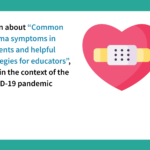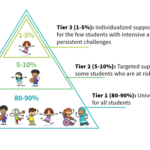Encompassing initiatives such as Positive Behavioral Interventions and Supports (PBIS) and Response to Intervention (RtI), Multi-tiered systems of support (MTSS) is a framework for providing high-quality academic instruction and behavioral interventions matched to student needs at multiple levels, monitoring progress frequently to assess whether instruction or goals should be adapted, and using data to solve problems and make important educational decisions.
Handle With Care: Expanding and evaluating trauma supports for students
Now more than ever, many children and youth are exposed to potentially traumatic events, whether it be from community or school violence, natural disasters, or the sudden loss of a loved one.
Continue reading →Promises and Pitfalls of PBIS Part 3: Strategies for educators to reduce implicit bias when responding to challenging behaviors
We highlight strategies educators can use to reduce implicit bias when responding to challenging behaviors, which is one of the five key components to reduce disproportionality in school discipline when implementing a PBIS approach.
Continue reading →Promises and Pitfalls of PBIS Part 2: Engaging Students and Families in Equity-Focused PBIS
In this second post in this series, we will discuss how to elevate the voices of students and families – one aspect of implementing a positive behavior framework that is preventive, multi-tiered, and culturally responsive.
Continue reading →Promises and pitfalls of PBIS Part 1: Importance of an equity-centered approach
Students who are Black, Latinx, and Native American are more likely than White students to be suspended or expelled – even when comparing consequences for the same infractions.
Continue reading →Practice-Based Coaching on the Pyramid Model: “It builds you up and finds your strengths”
SRI Education researchers are conducting an evaluation of the Pyramid Model, a three-tiered framework that supports early childhood education (ECE) teachers in preschool classrooms. The main goals of the Pyramid Model are to support ECE teachers as key figures in promoting the social-emotional skills and competence of children with and ...
Continue reading →Strategies for engaging students in in-person, virtual, and hybrid instruction
As schools begin a post-pandemic transition, educators should consider how to strengthen the social, emotional, and behavioral supports for students. Three foundational components are important to keep at the forefront of efforts to support students, regardless of the learning environment…
Continue reading →5 things educators can do virtually to support students experiencing trauma
In the context of the COVID-19 pandemic, we adapted strategies from the “Common trauma symptoms in students and helpful strategies for educators” handout to help educators address student’s social-emotional and mental health needs associated with trauma in virtual settings.
Continue reading →Positive Behavior Support at home
This award-winning 5 minute video from the Association for Positive Behavior Support (APBS) offers a clear explanation of Positive Behavior Supports as well as ways that families can use them at home.
Positive Behavior Support at Home from Association for PBS on Vimeo.
Continue reading →Questions to ask before implementing a school-wide program
Multi-tiered systems of support (MTSS) typically include school-wide or universal support (tier 1), targeted interventions for at-risk students (tier 2), and individualized services for students with intensive needs (tier 3). Read our post for more information about multi-tiered frameworks. MTSS have been increasingly adopted across schools in the U.S. and ...
Continue reading →Multi-Tiered Systems of Support pyramid
MTSS stands for multi-tiered systems of support. It is a framework to provide academic and behavioral supports for all students based on their individual needs. Because different students have different strengths and needs, tailored levels of support are more likely to help them succeed in school.
Content excerpted from our blog ...
Continue reading →









